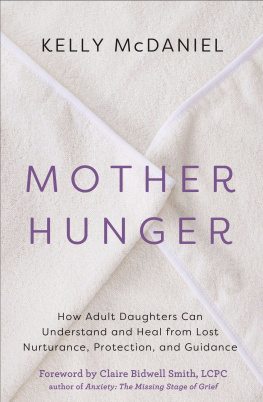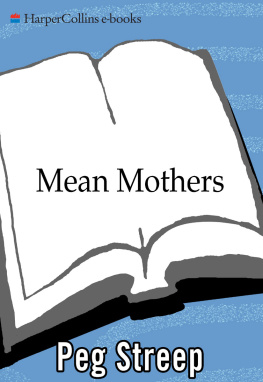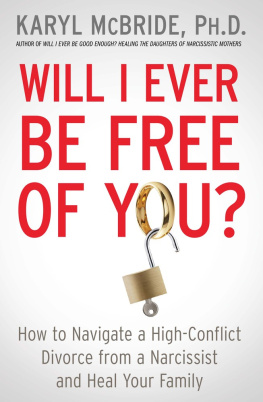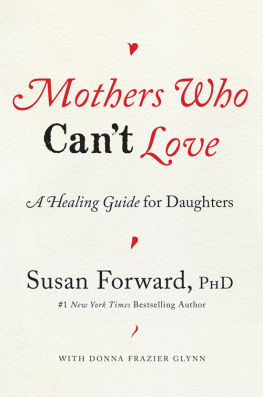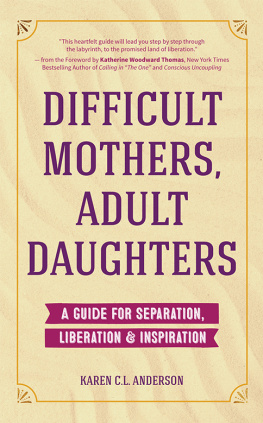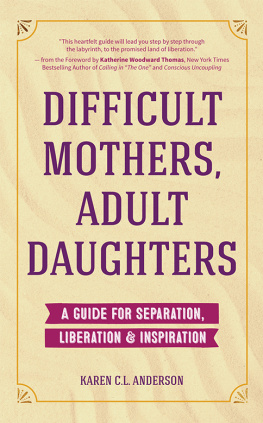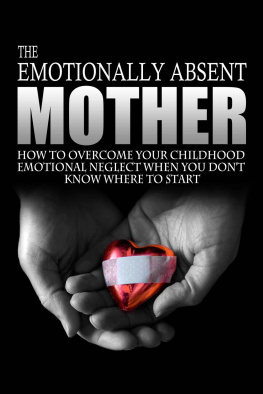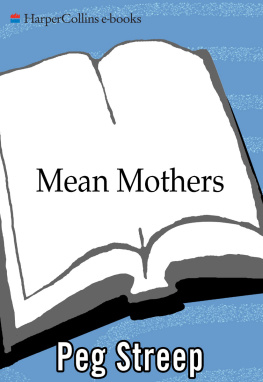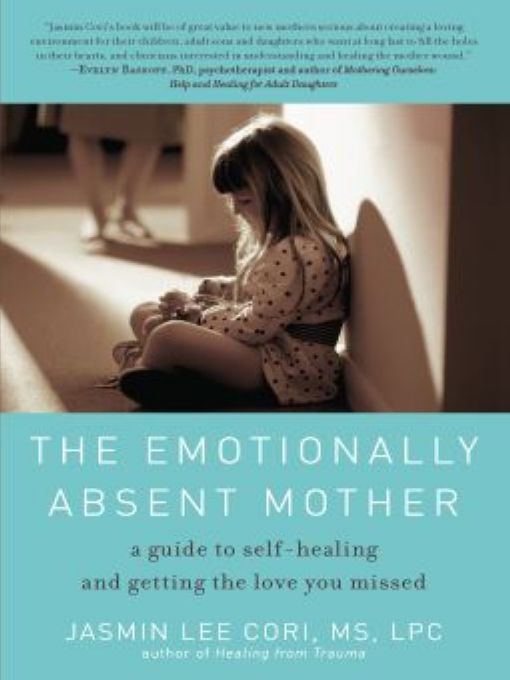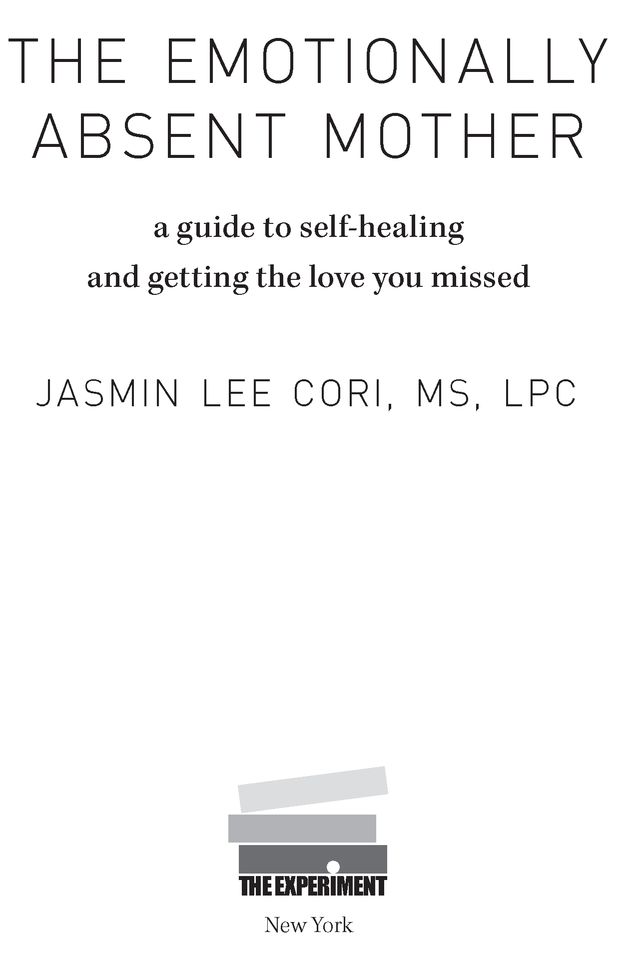Table of Contents
Praise for The Emotionally Absent Mother
With compassion and sparkling clarity, Jasmin Lee Cori describes the effects of being undermothered and what it takes to overcome them. Her book will be of great value to new mothers serious about creating a loving environment for their children, adult sons and daughters who want at long last to fill the holes in their hearts, and clinicians interested in understanding and healing the mother wound.
EVELY N BASSOFF, PHD, psychotherapist, author of Mothers
and Daughters: Loving and Letting Go
This book is a revelation to those of us whose mothering was short of what we needed. The author sensitively and authoritatively weaves developmental principles into a compassionate understanding of what it means to be undermothered.
CONNIE DAWSON, PHD, coauthor of Growing Up Again: Parenting
Ourselves, Parenting Our Children
Jasmin Lee Cori has done a superb job of describing the importance of childhood attachment needs and the psychological wounds that get inflicted when an emotionally absent mother cannot meet those needs well enough. She has skillfully laid out clear steps wounded adults can take to identify their inner strengths and heal attachment wounds. I wholeheartedly recommend this book for anyone who wishes to understand and heal the wounds that can arise when parented by an emotionally absent mother.
SHIRLEY JEAN SCHMIDT, MA, LPC, author of The Developmental
Needs Meeting Strategy: An Ego State Therapy for Healing
Adults with Childhood Trauma and Attachment Wounds
BECAUSE EVERY BOOK IS A TEST OF NEW IDEAS
With a compassionate and steady voice, Jasmin Lee Cori guides the reader through the difficult terrain faced by adults who have grown up without sufficient emotional mothering. Relying on personal experience and practice as a psychotherapist, she provides insight and tools to help readers overcome the challenges of a painful childhood and to move into the pleasures of living adult life fully.
KATHRYN BLACK, MA, psychotherapist, author of Mothering
Without a Map: The Search for the Good Mother Within
This book effortlessly intertwines neuroscience with clinical acumen in a lovely work of extraordinary depth. In her compelling, heartrending analysis of the importance of motherhood, Jasmin Lee Cori has created a work as significant as Alice Millers Prisoners of Childhood. Easily accessible and very useful, it is a must-read for parents-to-be, those in the helping professions, and adults who have been wounded by a negligent parent.
KATE CROWLEY, OTD, OTR/L, Adjunct Faculty, University
of Southern California, Specialist in Infant Mental Health
Also by Jasmin Lee Cori, MS, LPC
Healing from Trauma: A Survivors Guide to
Understanding Your Symptoms and Reclaiming Your Life
The Tao of Contemplation: Re-Sourcing the Inner Life
The Tarot of Transformation (with Willow Arlenea)
To the motherless child
who somehow survived
all that was missing,
even when Mother was there.
This book is for you.
Mommy, Where Were You?
My first steps
I stood there teetering, so proud,
ecstatic as a baby bird learning it could fly.
When I looked back, my smile about to break my face,
I couldnt find you.
Mommy, where were you?
My first day of school
boarded onto that noisy, clackety bus
going to a strange place
kids crowding, adults peering,
the whole world new to me.
Mommy, where were you?
The first time I came home crying
the butt of childrens laughter,
their words still stinging in my head,
I would have liked some consolation
but you were silent.
You are there in old photographs
but in my memories, you are missing.
I dont remember cuddling or being comforted
no special moments, just the two of us
I dont remember your smell or the feel of your touch.
I remember the color of your eyes
and the pain deep inside them
the pain usually hidden, like so much else,
beneath the mask I couldnt get behind.
You looked but didnt see me.
Your warmth never reached my little girls heart.
Why did we miss each other, Mommy?
Where were you?
Was it because of me?
- JC
Introduction
Few experiences in life are as deep as the feelings we carry about our mothers. The roots of some of these feelings are lost in the dark recesses of preverbal experience. The branches go every which way, some holding glorious, sun-drenched moments, while others are broken off, leaving sharp and jagged edges that we get caught on. Mother is not a simple subject.
On both a cultural and a psychological level, our feelings about mothers are often inconsistent and tangled. Mom and apple pie are potent symbols, venerated in our national psyche but neglected in national policy, as reflected, for example, in our meager family leave policies in comparison with other developed countries. If we were really serious about mothering, we would provide more financial and in-home help as well as education for mothers. As it currently stands, mothers are held up on a pedestal with little support beneath them.
As adults we are aware of this. Few escape the feeling that mothers are to be honored, or the awareness that mothers are too often taken for granted, their sacrifices unappreciated. Yet many of us are secretly (or not so secretly) unsatisfied with what we got from our mothers, resentful thatwhether their fault or notthey failed to provide important aspects of what we needed. And were paying the price.
These are sensitive issuessensitive for mothers and sensitive for all of us. Some, in a need to make mothers off-limits from criticism, become critical of those who are unsatisfied, blaming us for blaming our mothers, as if we are unfairly passing off the responsibility for our suffering. While I dont deny that some may use blame as a distraction and fail to take responsibility for the arduous task of healing, what I see more often as a therapist is the enormous guilt and resistance people have to work through to stop protecting their mothers. It is as if, even within the privacy of our own minds, we are afraid to criticize her. We are protecting the image of mother inside, protecting our fragile relationship with her by denying anything that might unsettle it, and protecting ourselves from the disappointment, anger, and pain that weve kept out of consciousness. As I will explain in the chapters that follow, many dont dare to uncover the painful truth of what was missing in their mothers because they are unprepared to deal with what this would mean.
Any relationship as complex as that between mother and child is going to include both love and hate. Most young children feel moments of hatred when their needs or wishes are frustrated, although many children wouldnt dare express this, their bond with Mommy far too fragile. And virtually all children feel love for Mother, even when that love is buried or walled off. As Robert Karen eloquently reported in his compilation of research on attachment:


